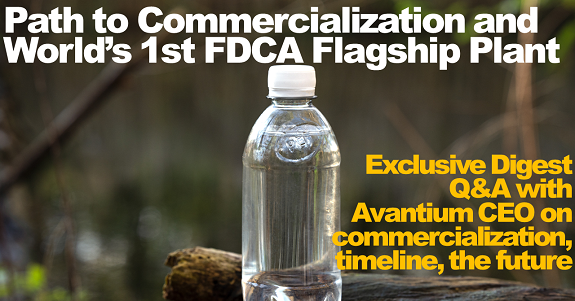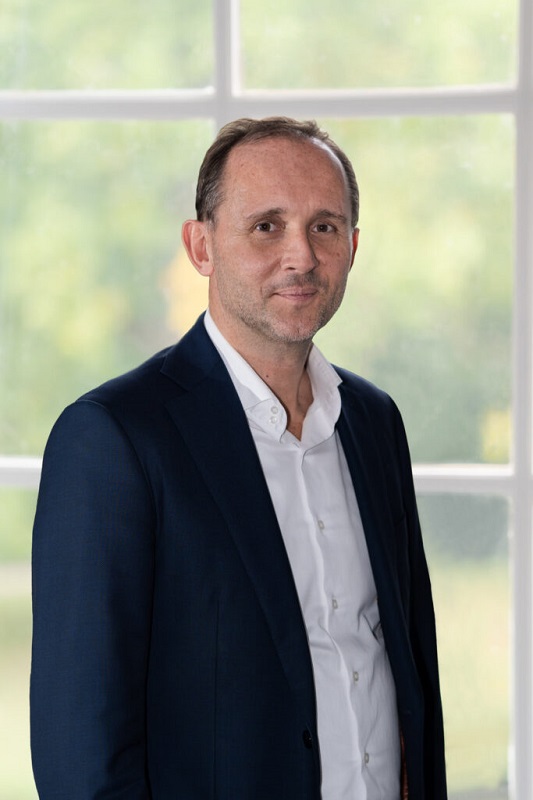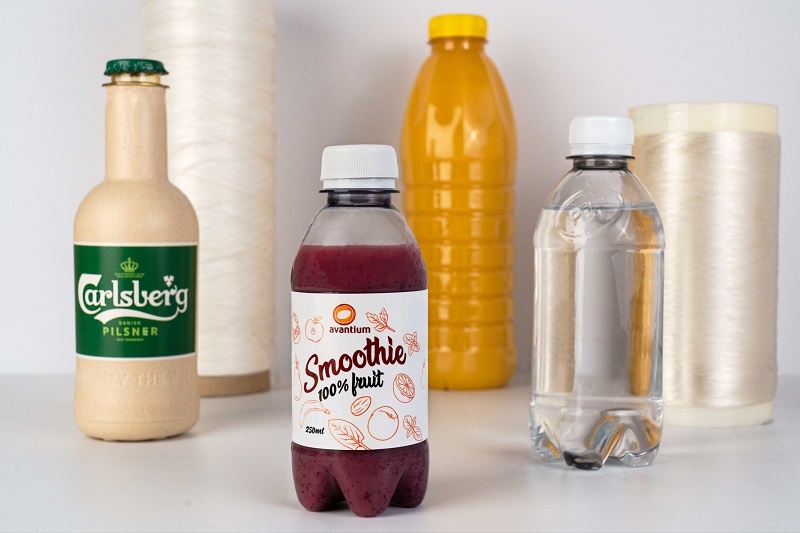Exclusive Digest Q&A with Avantium’s CEO about World’s 1st FDCA Flagship Plant

The stars were aligning for the world’s 1st FDCA Flagship Plant construction when Avantium’s shareholders granted the requested approvals for all items on the agenda related to it earlier this year with an expected operational date of 2024, enabling the commercial launch of PEF from 2024 onwards. So what’s the status now? What’s the inside take on next steps and plans?
In today’s Digest, an exclusive Digest Q&A with Tom van Aken, Avantium’s CEO on commercialization timeline and plans, partners involved, where they see the future of sustainable plastics and packaging going, why FDCA, the main building block of the 100% plant-based, recyclable plastic PEF (polyethylene furanoate) is so important in the commercial launch of PEF, what we can expect from 2024 onwards, and more…and it’s ready for you now at The Digest online.
Backstory
Earlier this year, The Digest reported that Avantium was getting everything in place to build the world’s 1st FDCA Flagship Plant and that shareholders granted the requested approvals for all items on the agenda related to the positive Final Investment Decision on the construction of the Plant.
In February, Avantium published its Life Cycle Assessment (LCA) data for its bottles made from PEF (polyethylene furanoate): a plant-based, fully recyclable plastic material. nova-Institut GmbH recently completed the ISOcertified LCA to assess the potential environmental impact of monolayer PEF and multilayer PET/PEF bottles. Compared to the incumbent fossil-based PET bottle designs, significant improvements in carbon footprint of around 35% in greenhouse gas (GHG) emissions can be achieved depending on the chosen application. This is also combined with the biogenic nature of the emissions (from renewable carbon) that a PEF bottle would release at end-of-life, which do not contribute additionally to global warming. Once PEF is commercially available, substantial economic, technological, and environmental optimisations are expected within the value chain, leading to further reduction of its environmental impact. So that’s another reason why commercialization of PEF is so important.
In addition, as all plants absorb carbon during growth, an inherent advantage of PEF-based products is the temporary storage of carbon dioxide. At the end-of-life of a PEF-based product (i.e. when PEF can no longer be recycled and is incinerated), this biogenic carbon re-enters the natural carbon cycle, whereas fossil-based plastics release carbon at the end-of-life that has been locked up in the ground for millions of years, increasing that total carbon amount of carbon in the atmosphere. Some non-EU companies report carbon-negative climate change results for their bio-based materials, taking this short-term carbon storage into account. European LCA standards and methods do not allow carbon discounting based on temporary storage and therefore this is not included in this LCA.
And just a few weeks ago, world luxury goods leader LVMH Group (Moët Hennessy Louis Vuitton) and Avantium agreed to further explore the potential of Avantium’s 100% plant-based, recyclable polymer PEF, as a sustainable packaging solution for LVMH beauty brands. To this end, LVMH beauty will be the first luxury cosmetic company to join the PEFerence consortium, further enabling the commercial introduction of PEF to the Cosmetics market. The PEFerence consortium, coordinated by Avantium, aims to replace a significant share of fossil-based polyesters with the novel, sustainable polymer PEF.
Let’s talk about the FDCA Flagship Plant
The Digest sat down with Tom van Aken, Avantium’s CEO, to find out more about the FDCA flagship plant, updates on their plans, where they see the future of sustainable packaging going, how governments, businesses and consumers can work better together to spearhead greener products and practices, and more – so check out this Digest exclusive Q&A with Tom van Aken.
Q: Now that shareholders approved the plans, what are the next steps for the plant and when/timeline?
van Aken: The preparations for the construction of the FDCA plant have already started. We then expect the construction to be completed by the end of 2023 (mechanical completion date).
Q: What are the commercialisation plans/timeline?
van Aken: We plan to start-up operations in 2024 and we expect PEF to hit the markets in the course of that year. In parallel we pursue licensing deals to enable further deployment and scale-up of FDCA and PEF production. It has taken us time to reach this point and fair to say that it was a bumpy road to get to this point. It doesn’t happen often that a new polymer is commercialized, so we are very proud that we are now at the point where this sleeping giant is waking up.
Q: Who are the partners working with on this? (tech partners, customers, engineering firms, etc.)
van Aken: We have built an ecosystem of partners throughout the PEF value chain. Over the years, PEF has attracted the interest and support of many partners – varying from offtake partners, governments, and financial partners. With the support of those important partners within the PEF value chain, Avantium is now ready to build and operate a first-of-a-kind FDCA flagship plant, meeting the growing global demand across a range of end-product markets.
We have signed five offtake agreements with customers across the globe (Europe, Asia, Americas), and representing a variety of applications – monolayer bottles, multilayer bottles and barrier film: Refresco, Toyobo, Terphane, Resilux and an undisclosed global food and beverage brand owner for FDCA and PEF. These offtakes represent over 50% of the flagship plant capacity. We have also deepened our collaboration with Carlsberg to develop PEF-based packaging for beer, such as the Green Fibre bottle. We have a strong pipeline of new potential opportunities for additional offtake agreements with international partners in the market for high-value PEF applications.
We have signed several agreements with financial partners to secure the funding required for the FDCA Flagship Plant, among which with the Dutch government backed investment fund Invest-NL.
We recently signed a strategic supply agreement with Tereos, whereby Avantium Renewable Polymers will purchase high fructose syrup made by Tereos from European wheat as the feedstock for the planned FDCA Flagship Plant. The multi-year agreement secures 100% bio-based and local feedstock for the flagship plant. For the construction phase, Avantium and Worley signed a engineering, procurement and construction contract for the FDCA Flagship Plant.
Q: Where do you see the future of sustainable plastics and packaging?
van Aken: To drastically cut CO2 emissions and to address problems of plastic pollution, the future of plastic is to make them out of renewable carbon and to make them fully circular. A rapid transition that moves away from petroleum based plastics polluting our atmosphere with CO2 and our natural systems with plastic waste. Not surprising that the petrochemical industry is fighting to maintain its business, but consumers and brands don’t want to be associated to petroplastics, they can’t justify the carbon emissions and associated waste problems. We think the future is a combination of green chemistry and fully circular products.
PEF has a remarkable combination of environmental and performance benefits, and the commercialisation marks a huge step forward in advancing to the circular economy.
Disruptive technologies need trailblazers to embrace new, sustainable solutions and pave the way for broader adoption. This milestone will open up more opportunities for partnerships to expand our ground-breaking technologies, and to produce sustainable alternatives for fossil-based chemicals and materials.
We’re already seeing great strides being made to reduce plastic waste as governments introduce new legislations and consumers change their habits. We aim to be part of this wider shift in behavioural changes, taking responsibility to ensure waste and pollution are reduced, while bringing sustainable products to the market.
Q: How can governments, businesses and consumers can work better together to spearhead greener products and practices?
van Aken: The journey to a fully circular economy can’t be done alone. Collaboration between businesses, scientists, and policymakers can help incite greater change. There is tremendous potential to build new supply chains and practices with stakeholders across industries using all parts of a plant to make chemicals and materials, but this takes collaboration. Finding partnerships with those who share the same environmental values is crucial to success. Reaching this pivotal milestone would have been impossible without support from the European, Dutch and local governments and likeminded strategic, financial and commercial partners along the way.
At Avantium, we continue to actively seek and engage like-minded partners to join us on our journey to create fossil-free, circular, and innovative plastic solutions, and can help commercialise our technology to bring it to consumers. We are working with major international brand holders and disruptive players to bring sustainable products, from packaging to textiles, to the global market, and we would love to bring other companies on board, now this is going commercial.
Q: What can we expect from 2024 onwards?
van Aken: We aim to sell out the Flagship Plant prior to start-up in 2024. We expect that our FDCA Flagship Plant is on stream and that the first PEF products are in our supermarkets, refrigerators, and day-to-day applications. Avantium has selected licensing to be the business model for the further roll-out of our FDCA and PEF technology. We strongly believe licensing our technology to other parties worldwide is the fastest way to bring commercial quantities of PEF to market. With Avantium’s FDCA and PEF technology, brand owners and monomer- and resin producers and converters have the tools to significantly reduce their carbon footprint and to get access to a sustainable material with unique performance benefits.
We’re also expanding our expertise in all key areas of our business, so expect to see further progress on our other sustainable technologies, including Ray and Dawn Technologies, Catalysis, and Volta.
And that’s the word from Tom van Aken, Avantium’s CEO. Thank you Tom!
Category: Top Stories















